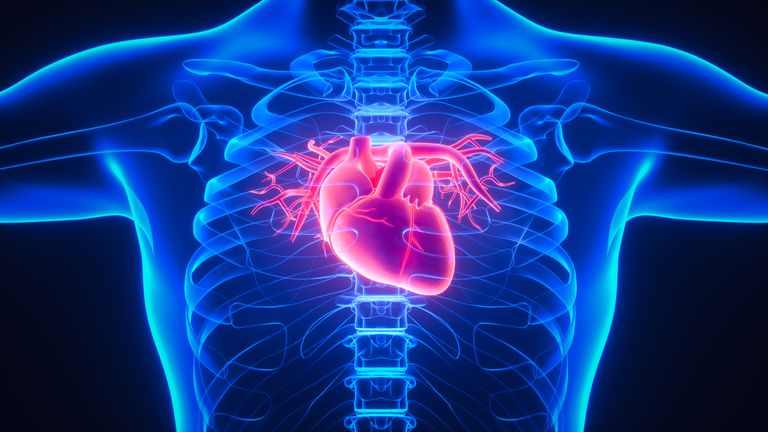[ad_1]
Brain changes linked to emotion have been found in people with “broken heart syndrome”.
Researchers have shed light on how the brain and heart are linked in this “enigmatic condition”.
Known medically as Takotsubo syndrome, it is usually brought on by physical or emotional stress, such as the loss of a loved one – hence the name.
What causes the condition is not fully understood, but it is a sudden form of acute heart failure and is estimated to affect 5,000 people in the UK each year.
The symptoms are the same as a heart attack and the risk of complications is similar, though the arteries leading to the heart are not blocked.
In the most detailed study of its kind, a team at the University of Aberdeen identified changes in activity levels in areas of the brain known to control emotions and the beating of the heart.
Dr Hilal Khan, clinical research fellow at the university, said: “For years we’ve known that there is a link between the brain and the heart, but the role this plays in Takotsubo has been a mystery.
“For the first time we’ve revealed changes in the brain regions that are responsible for controlling the heart and emotions.
“Further work will be required to determine if these changes cause Takotsubo syndrome.”
Dr Khan said that with more research it is hoped more effective ways of treating the syndrome can be found.
The researchers looked at the brains of 25 patients who had suffered an episode of the syndrome in the previous five days.
Using brain MRI scans, they measured brain volume, surface area and the signals of communication between different areas of the brain.
These results were then compared with control patients who were matched for age, gender and other medical conditions.
The researchers found that there were decreased connections in the thalamus, amygdala, insula and basal ganglia of Takotsubo patients compared with healthy people.
These are areas of the brain involved in regulating higher-level functions such as emotions, thinking, language, stress responses and controlling the heart.
The university’s research was presented at the British Cardiovascular Society centenary conference in Manchester.
Professor James Leiper, associate medical director at the British Heart Foundation, said: “This research is a significant step forward in our understanding of how the brain and the heart are intricately linked in this enigmatic condition, and how an emotional event can lead to heart failure.”
Read more from Sky News:
Cancer disappears in every patient in small drug trial
Monkeypox designated a notifiable disease
Two million people in UK estimated to have long COVID
Carol Duncan, 73, from Aberdeen, is part of the study as she suffered an episode of Takotsubo after her brother fell ill and was admitted to ICU.
She said because Takotsubo can be triggered by an emotional event, there is a misconception that it is just in your head.
“Knowing that researchers saw measurable changes in my scans makes me feel that we are getting closer to Takotsubo being considered a physical condition,” she said.
“I am so pleased to have taken part in this research.
“It really gives me hope that scientists are moving towards fully understanding and better treating this misunderstood condition.”
[ad_2]








